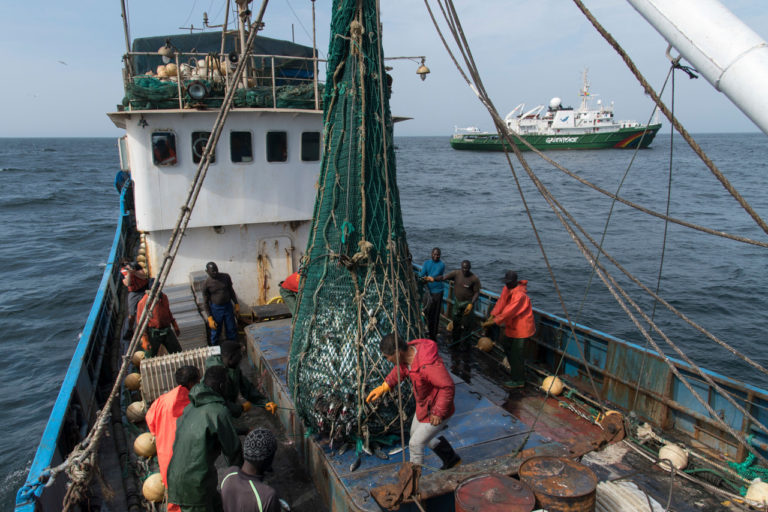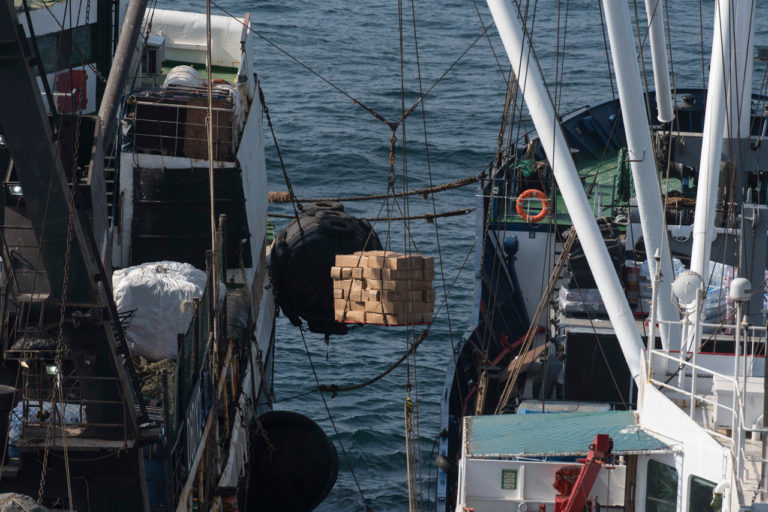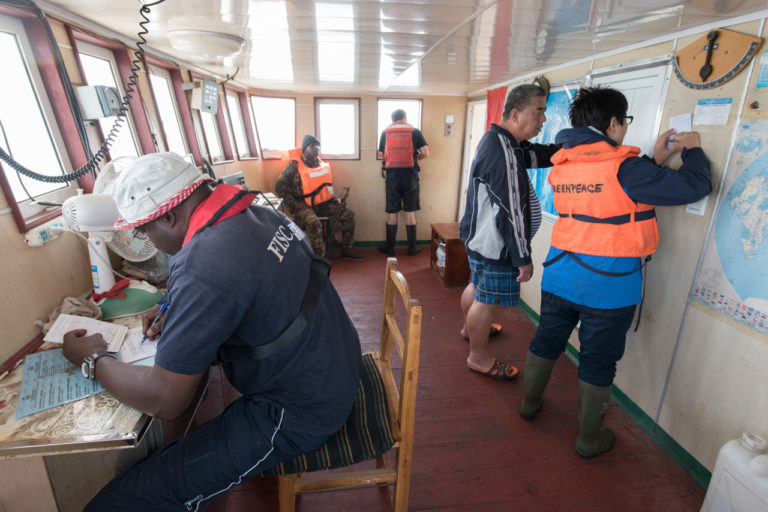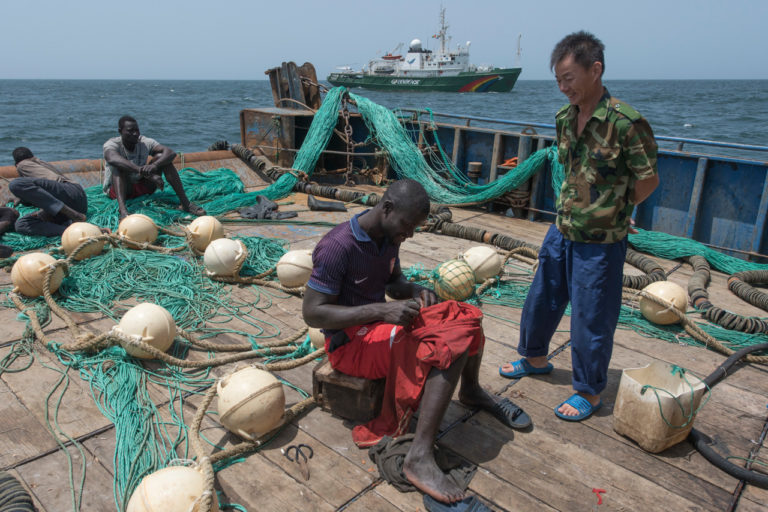- Between March 21-24, Greenpeace and officials from Guinea-Bissau’s Fisheries Surveillance Department sent four boats into the port of Bissau, where the companies that own the boats face sanctions for unpaid fines for past violations, improperly indicating the names of vessels, and what’s known as ‘illegal transshipment.’
- Two of the boats were owned by a Spanish company, and the other two were owned by companies based in China, which has by far the most ‘distant-water fishing’ boats at sea of any country.
- The UN Food and Agriculture Organization found that, in 2009, the fisheries off West Africa had the highest rates of overexploitation in the world.
A joint patrol by the environmental organization Greenpeace and fisheries managers in the West African country of Guinea-Bissau has turned up a bevy of fishing boats that Greenpeace says were violating national laws.
“Fishing companies and crews have gotten used to exploiting Guinea Bissau’s insufficiently managed waters,” said Pavel Klinckhamers, a Greenpeace project leader on the ship Esperanza, in a March 28 statement.
The Esperanza is in the midst of a cruise to investigate the state of West Africa’s fisheries, an important food source for some of the poorest countries in the world. In Guinea-Bissau, they are working with the country’s Fisheries Surveillance Department – known by the acronym FISCAP – and have members of that team on board.

Greenpeace reported in the statement that, in the process of inspecting and documenting illegal fishing activities between March 21-24, they sent four boats into the port of Bissau, Guinea-Bissau’s capital. There, the companies that own the boats face sanctions for unpaid fines for past violations, improperly indicating the names of vessels, and what’s known as “illegal transshipment.”
Transshipment among fishing boats involves the transfer of catches from one vessel to another. According the organization Stop Illegal Fishing, based in Gaborone, Botswana, the practice is used to increase fishing efficiency, as larger boats offload the fish they’ve caught to “reefers,” or small boats that then transport the catch to shore.
However, investigations have shown that transshipment is also an effective way for companies to “launder” catch, says Stop Illegal Fishing. The reefers don’t have to abide by catch limits, and “by mixing illegal and legal fish the illegal fish takes on the documentation of the legal fish,” the organization writes on its website.
Greenpeace said that its discovery of these boats, as well as several others in apparent violation of laws in Guinea-Bissau’s territorial waters, highlights the problems with the industry in West Africa.

“The fact that we managed to come across such a high number of vessels breaking the law in only a few days really confirms the alarming ‘Wild-West’ situation in the waters of West Africa,” Clinchers said in the Greenpeace release.
Illegal fishing by foreign vessels has grown substantially in recent decades in the oceans around Africa and elsewhere in the world. China overwhelmingly has the most “distant-water fishing” boats in operation all around the world, with 3,400, and they have frequently been accused of operating outside the law. By comparison, the United States has 200 ships afloat.
Two of the boats turned back to port by the Esperanza were Chinese. The Yi Feng 8, a bottom trawler owned by Yi Feng Aquatic Products Company based in Dalian, had its name printed in only Chinese. By law, boats must carry “easily recognizable names,” Greenpeace said.
The Chang Yuan Yu 5 is also a trawler and is owned by Dalian Chang Hai Pelagic Fishery Company, also based in Dalian. The company has yet to pay fines for using illegal nets in September 2016, Greenpeace said.

The two other boats sent to Bissau, the Flipper 4 and the Saly Reefer, were caught moving the Flipper 4’s catch to the Saly Reefer. Guinea-Bissau outlawed transshipment in 2015. Both ships are owned by Sea Group, a company based in Las Palmas, Spain.
Mongabay contacted Sea Group, Yi Feng Aquatic Products Company and Dalian Chang Hai Pelagic Fishery Company by email requesting comment, but received no responses.
The specter of “illegal, unregulated and unreported” (IUU) fishing by foreign and domestic boats is leaving its mark on a part of the world that struggles with poverty and food insecurity. Guinea-Bissau ranked 178th out of 188 countries on the UN’s Human Development Index in 2015.
“The repercussions of fish stock depletion on food security and economy in some of the most vulnerable countries in the world is extremely concerning and must be tackled,” said Ibrahima Cisse, oceans campaign manager with Greenpeace Africa, in the statement.
A report by the Overseas Development Institute found that IUU fishing has cost West African countries around 300,000 jobs as artisanal fishermen and women. In another study, published in March in the journal Frontiers in Marine Science, analysis showed that six West African countries – Gambia, Guinea, Guinea-Bissau, Mauritania, Senegal and Sierra Leone – lost $2.3 billion to illicit fishing that slipped past the scrutiny of monitors between 2010 and 2016.

Those monitoring efforts only managed to recoup $13 million – one reason that Cisse and Greenpeace are arguing for a “regional fisheries management body.”
The impacts of the resulting decline of West African fisheries are finding their way into the daily lives of the millions of people dependent on fish from this part of the Atlantic Ocean. A 2011 review by the UN Food and Agriculture Organization, or FAO, found that the greatest proportion of fish stocks in the world – 54 percent – were “overexploited.”
“West Africa is the only region in the world where fish consumption is declining due to over-exploitation of resources by too many vessels and by illegal fishing operations,” Greenpeace’s Cisse said.
“In West Africa, where people rely heavily on fish as one of their main sources of protein, it is a vital source of income and employment for nearly seven million people.”
FEEDBACK: Use this form to send a message to the author of this post. If you want to post a public comment, you can do that at the bottom of the page.
CITATIONS:
- Daniels, A., Gutierrez, M., Fanjul, G., Guerena, A., Matheson, I., and Watkins, K. (2016). Western Africa’s Missing Fish. The Impacts of Unreported and Unregulated Fishing and Under-Reporting Catches by Foreign Fleets. London: Overseas Development Institute.
- Doumbouya, A., Tagbe Camara, O., Mamie, J., Intchama, J. F., Jarra, A., Ceesay, S., … & Belhabib, D. (2017). Assessing the effectiveness of Monitoring Control and Surveillance of illegal fishing: the case of West Africa. Frontiers in Marine Science, 4, 50.
- FAO. (2011). Review of the state of world marine fishery resources. FAO Fisheries and Aquaculture Technical Paper No. 569. Rome, FAO. 2011. 334 pp.